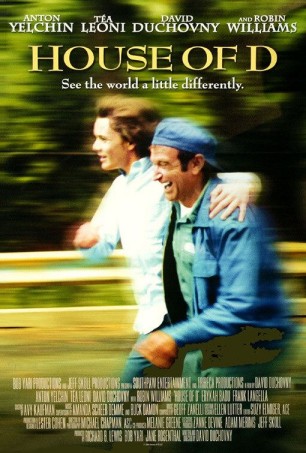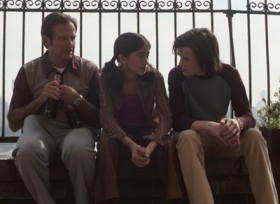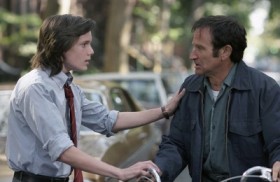|
House
of D
First-time filmmakers sometimes get lost in their own stories
when attempting to convey stories that hit close to home.
Others are able to inject aspects of their pasts into their
work without allowing sentimental attachment to the past
to cloud the focus of their film.
It’s
unsure whether or not House of D is based upon
the life of its writer/director David Duchovny, but it certainly
feels close to home for the first-time director. The result
is a clouded tale that should, by all means, intrigue and
touch audiences in a very resounding fashion, but ultimately
falls short of doing so effectively.
Duchovny’s
film begins with images of Tom Warshaw, an American artist
who has transplanted himself to France in search of, well,
we aren’t sure initially. He likes to draw under his
bed, and in voiceover, drones on about his past and something
about finally coming clean about his history to his wife
and child. Why? What dark secret does Tom hold inside, closed
off from the rest of the world? We don’t know, but
upon stating his intent it becomes clear that by the film’s
end, we surely will.
The
secret is found in his childhood, which was spent under
the loving care of his neurotic mother (Tea Leoni) in New
York City. His confession is centered on the events that
led young Tommy to close himself off emotionally to the
rest of the world.
Tommy
wasn’t much different than your average thirteen-year-old
American boy growing up in the seventies. He attends an
all boys school on scholarship while his single mother balances
lamenting the loss of her husband to cancer and the remainder
of Tommy’s tuition to continue his education.
Tommy’s
story is a rather routine “coming of age” tale
with a few noticeable touches that set it apart in places.
His eye eventually catches the eye of a young girl whom
he fancies, much to the chagrin of his best friend, Pappass
(Robin Williams). Pappass is “retarded,” a term
that the film notes was acceptable at the time, and works
a meat delivery route with Tommy when not moonlighting as
the school’s Assistant Janitor. Or perhaps it’s
the other way around.
Pappass’
father is a drunk, who spends the majority of his time…well,
drinking. When he isn’t imbibing, he is stealing Pappass’
tips and wages to buy more booze in which to drown his sorrows.
These are characters with struggles, but they are all characters
whose struggles act as a jail cell.
At times
metaphoric, at others simplistic writing, Duchovny’s
script fails to choose one and run with it, opting instead
to bounce back and forth between the two.
Which
brings us to Lady Bernadette (Erykah Badu), a woman remanded
to solitary confinement in the Women’s House of Detention
and who offers Tommy advice in the affairs of the heart
along the way. Notice that the title of the film refers
not to the “House of Duchovny,” but rather to
the Women’s “House of D,” at which Tommy
receives advice that will forever alter his life and change
his outlook in regards to affairs of the heart.
Overall,
the film is enjoyable. It offers moments of innocence that
often endear in films such as this, but as aforementioned
remains flawed in the end. How? Well, the effects of Tommy’s
youth are stated to have stunted his ability to function
as an adult, but we never see evidence of this within the
film other than expository dialogue indicating such. Duchovny’s
performance, as an adult Tom, feels as if he is a loving
father and husband, but everyone behaves as though he isn’t.
The
reasoning behind Tommy’s crush Melissa (Zelda Williams)
turning their relationship off at the drop of the hat serves
only to play into a convenient “domino” sequence
in which all that Tommy has going for him falls over all
around him. The film is littered with moments of convenience
such as this, and it fails to keep the film feeling like
it’s “playing fair” with its audience.
Tommy’s
troubles are ultimately resolved, but other than his hardships
from his past it is difficult to see exactly what these
troubles might be. Growing past ones past can be difficult,
undoubtedly, but the film sets about with the premise of
“fixing” something, but how can you fix something
that doesn’t appear broken to begin with?
Rating:

|








